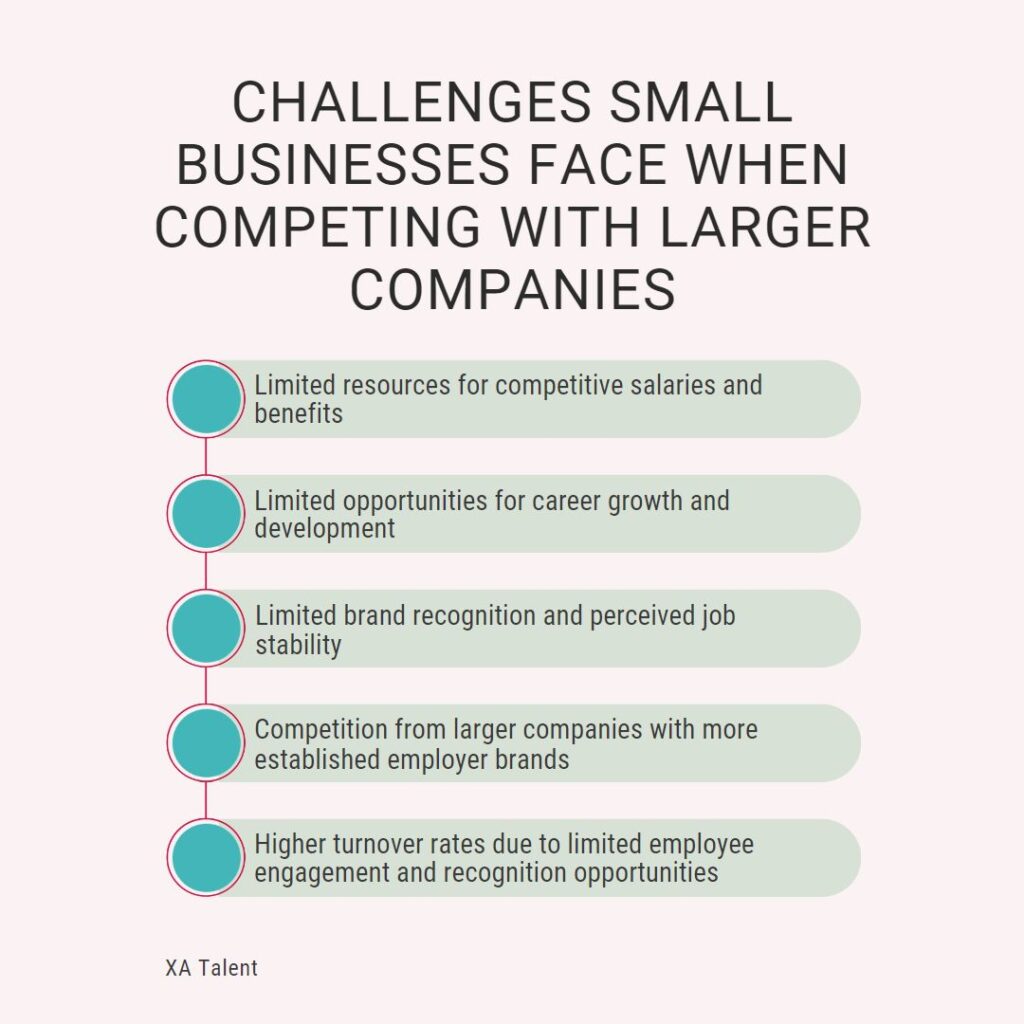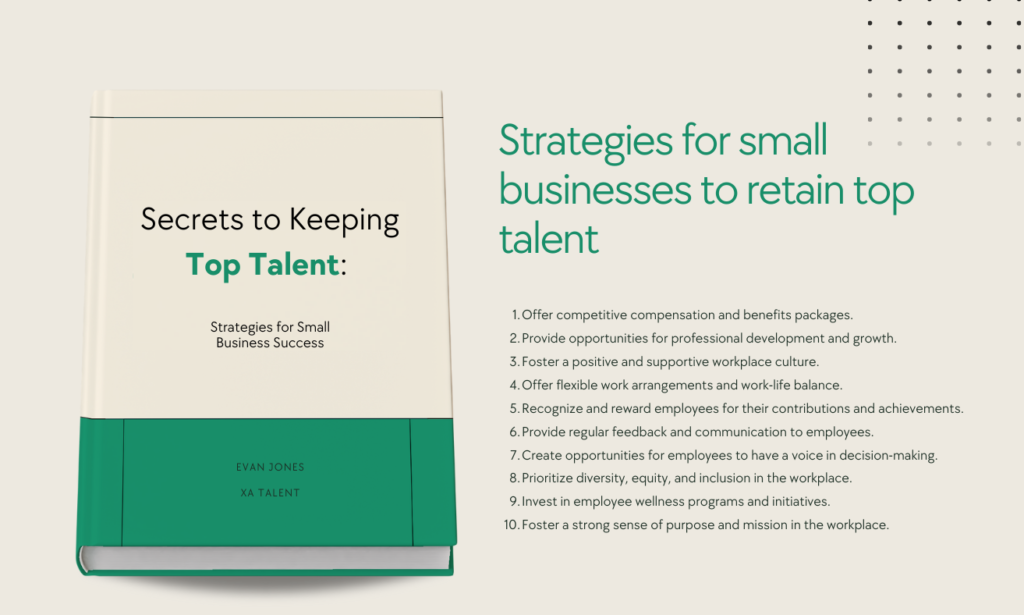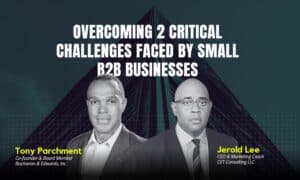
- April 19, 2023
- Abigail Sel
- 0
Discover the Winning Formula for Small Businesses to Attract and Retain the Best Talent
In today’s competitive business landscape, talent acquisition and retention have become critical factors in the success of any organization, including small businesses. Small businesses face unique challenges when competing with larger companies for top talent, which often have more resources and budget to attract and retain skilled individuals. Therefore, small businesses must develop creative strategies to compete effectively in the job market and attract and retain top talent.
This article will discuss the importance of talent acquisition and retention for small businesses and the potential negative consequences of failing to do so. We will also explore the challenges that small businesses face when competing with larger companies for top talent, such as resource limitations and limited access to a diverse pool of candidates.
In addition, this article will provide actionable strategies that small businesses can implement to attract and retain top talent. We will discuss the importance of building an attractive company culture, offering competitive compensation packages, and leveraging social media and online job boards to attract candidates. We will also cover the importance of providing professional development opportunities and a flexible work environment to retain top talent. By implementing these strategies, small businesses can attract and retain talented individuals and gain a competitive edge over larger companies.
Importance of Talent Acquisition and Retention for Small Businesses
In today’s competitive business environment, talent acquisition and retention have become crucial for the success of any organization, especially small businesses. Skilled and committed employees can drive growth, improve productivity, and enhance overall performance. However, failing to attract and retain top talent can result in negative consequences for a business, including high turnover rates, decreased productivity, and increased costs.
One of the most significant positive effects of acquiring and retaining top talent is improved productivity. A study by Deloitte found that companies with a strong culture of employee engagement are 18% more productive than their competitors. Additionally, a study by Gallup found that engaged employees are 21% more productive than their disengaged counterparts. A skilled and committed workforce can increase productivity and efficiency in the workplace through effective collaboration and teamwork. By attracting and retaining top talent, small businesses can enhance their overall productivity, which can lead to increased profitability and business performance.
Acquiring and retaining top talent can also result in enhanced business performance. Skilled employees can contribute to the development of new products and services, which can lead to increased revenue. According to a study by McKinsey, companies with diverse workforces are 35% more likely to have above-average financial returns. By attracting and retaining diverse top talent, small businesses can enhance their innovation and competitiveness in the market.
Attracting and retaining top talent is not just crucial for small businesses, it's essential. It drives growth, improves productivity, and enhances overall performance. By investing in skilled and committed employees, small businesses can boost innovation, enhance productivity, and achieve long-term stability. Retaining top talent is a win-win for both businesses and employees.
Evan Jones - Founder & CEO Tweet
Retaining top talent can also provide stability and consistency to a business, which can contribute to long-term growth and success. A study by Harvard Business Review found that employees who stay with a company longer are more committed and productive than those who switch jobs frequently. Additionally, retaining top talent can save a business money on recruitment and training costs, which can be expensive and time-consuming.
Failing to attract and retain top talent can result in high turnover rates, which can be costly and disruptive for a business. A study by the Society for Human Resource Management found that the cost of replacing an employee can range from 50% to 200% of their annual salary. Additionally, frequent turnover can lead to decreased productivity and morale, as new employees may take time to adjust and become proficient in their roles.
Moreover, losing skilled employees can result in decreased productivity and efficiency, which can negatively impact a business’s bottom line. According to a study by the Center for American Progress, the cost of turnover for a worker earning $30,000 to $50,000 per year is approximately 20% of their salary. New employees may require additional time and resources to become proficient in their roles, which can result in a temporary decrease in productivity.
Therefore, acquiring and retaining top talent is essential for small businesses to remain competitive and achieve long-term success. By attracting and retaining skilled and committed employees, small businesses can enhance their productivity, business performance, and growth potential. Conversely, failing to attract and retain top talent can result in negative consequences such as high turnover rates, decreased productivity, and increased costs. Therefore, small businesses should prioritize talent acquisition and retention and develop effective strategies to compete effectively in the job market.
Challenges Small Businesses Face When Competing with Larger Companies
Small businesses face unique challenges when competing with larger companies for top talent. These challenges can include resource limitations, lack of brand recognition, and limited access to a diverse pool of candidates.
Resource limitations can be a significant obstacle for small businesses in attracting and retaining top talent. Larger companies often have more resources and budget to offer competitive compensation packages, comprehensive benefits, and other perks. In contrast, small businesses may have to operate on a limited budget and cannot offer the same level of compensation or benefits.
Lack of brand recognition is another challenge that small businesses may face when trying to attract top talent. Larger companies often have established brand recognition, which can make them more attractive to job seekers. In contrast, small businesses may struggle to differentiate themselves from their competitors and attract top talent.
Limited access to a diverse pool of candidates can also be a challenge for small businesses. Larger companies often have more extensive recruiting networks and resources, which can provide them with access to a broader range of candidates. In contrast, small businesses may be located in areas with limited talent pools or may struggle to attract candidates from diverse backgrounds.

Strategies for Small Businesses to Attract Top Talent
Small businesses face unique challenges when competing with larger companies for top talent. However, there are several strategies that small businesses can implement to attract and retain top talent. By developing an attractive company culture, offering competitive compensation packages, building relationships with educational institutions, and leveraging social media and online job boards, small businesses can attract top talent and compete effectively in the job market.
1. Developing an attractive company culture is one effective strategy that small businesses can use to attract top talent. A study by LinkedIn found that 70% of professionals would not work at a leading company if it meant they had to tolerate a bad workplace culture. Therefore, creating a positive work environment, offering opportunities for career growth and development, and promoting work-life balance can be effective ways to attract and retain top talent.
2. Offering competitive compensation packages is another strategy that small businesses can use to attract top talent. While small businesses may not be able to match the compensation packages offered by larger companies, they can offer other non-monetary incentives such as flexible work arrangements or additional vacation time. A study by Glassdoor found that 57% of employees consider benefits and perks as the top factors when considering a job offer. Therefore, offering competitive compensation packages and non-monetary incentives can be an effective way for small businesses to attract and retain top talent.
3. Building relationships with educational institutions is another strategy that small businesses can use to attract top talent. Developing internship programs or participating in on-campus recruiting events can provide small businesses with access to a diverse pool of candidates. Additionally, partnering with educational institutions can help small businesses to build their brand recognition and attract top talent.
4. Leveraging social media and online job boards is another effective strategy that small businesses can use to attract top talent. Social media platforms like LinkedIn and Twitter can provide small businesses with a platform to showcase their company culture, job openings, and unique offerings. Online job boards can also provide small businesses with access to a wider pool of candidates.
In addition to attracting top talent, it is also essential for small businesses to retain their skilled employees.
5. Offering professional development opportunities is one effective way for small businesses to retain top talent. By providing access to training courses and programs, small businesses can help employees learn new skills and take on new responsibilities. Encouraging employees to attend industry conferences and events can also be an effective way to retain top talent.
6. Providing a flexible work environment is another effective way for small businesses to retain top talent. Offering telecommuting and remote work options, as well as flexible work schedules, can help employees balance their work and personal lives. Additionally, encouraging employee feedback and implementing changes based on that feedback can help employees feel valued and engaged in the workplace.
In short, small businesses can attract and retain top talent by implementing effective strategies such as developing an attractive company culture, offering competitive compensation packages, building relationships with educational institutions, and leveraging social media and online job boards. Additionally, small businesses can retain top talent by offering professional development opportunities, providing a flexible work environment, and encouraging employee feedback. By prioritizing talent acquisition and retention, small businesses can gain a competitive edge in the job market and achieve long-term successI.

Strategies for Small Businesses to Retain Top Talent
Retaining top talent is crucial for small businesses to maintain productivity and competitiveness in the job market. By offering professional development opportunities, providing a flexible work environment, and encouraging employee feedback, small businesses can retain their skilled employees and achieve long-term success.
1. Offer competitive compensation and benefits packages
One of the most crucial aspects of retaining top talent is offering competitive compensation and benefits packages. Employees need to feel that they are being compensated fairly for their skills and experience. Additionally, offering attractive benefits packages such as health insurance, retirement plans, and paid time off can enhance employee satisfaction and loyalty.
For example, Seattle-based software company, Gravity Payments, offers its employees a minimum salary of $70,000 and a full range of benefits, including healthcare and retirement plans. The company’s former CEO, Dan Price, implemented this policy after reading a study that found a positive correlation between employee happiness and salary levels. Since implementing the policy, the company has reported increased productivity, employee retention, and profitability.
2. Provide opportunities for professional development and growth
Employees want to feel that their careers are progressing and that they are continually learning and growing. Providing opportunities for professional development and growth can help retain top talent. Offering training programs, mentoring, and opportunities for advancement can help employees feel valued and invested in the company’s success.
For example, software company, Adobe, offers its employees a range of training programs and opportunities for advancement. The company’s Talent Development team provides a variety of training courses, including leadership development, technical training, and business skills training. Additionally, Adobe encourages employees to pursue job rotations and job sharing, which can help employees gain new skills and experiences.
3. Foster a positive and supportive workplace culture
Creating a positive and supportive workplace culture can enhance employee satisfaction and loyalty. A positive workplace culture can help employees feel valued and connected to the company’s mission and values. Additionally, a supportive workplace culture can enhance employee engagement and productivity.
For example, the online retailer, Zappos, is known for its unique and positive workplace culture. The company’s late CEO, Tony Hsieh, has emphasized the importance of creating a happy and engaged workforce. Zappos offers employees a range of perks, including free lunches, on-site massages, and a pet-friendly workplace. Additionally, the company has a strong emphasis on employee recognition and celebrates employee achievements regularly.
4. Offer flexible work arrangements and work-life balance
Offering flexible work arrangements and work-life balance can help retain top talent, particularly for employees with families or other personal responsibilities. Providing options such as flexible hours, remote work, or job sharing can help employees feel that their work and personal lives are being balanced.
For example, technology company, Dell, has implemented a range of flexible work arrangements, including telecommuting and flexible hours. The company’s Connected Workplace program aims to provide employees with a range of options for working remotely and maintaining a healthy work-life balance.
5. Recognize and reward employees for their contributions and achievements
Recognizing and rewarding employees for their contributions and achievements can enhance employee satisfaction and motivation. Acknowledging employee successes can help them feel valued and invested in the company’s success.
For example, outdoor clothing company, Patagonia, has a strong emphasis on employee recognition and rewards. The company regularly recognizes employees for their achievements and contributions through awards programs and bonuses. Additionally, the company has a program called the “Let My People Go Surfing” policy, which encourages employees to take time off to pursue their passions.
Final Thoughts
Talent acquisition and retention are critical for the success of small businesses. Small businesses face unique challenges when competing with larger companies for top talent, but by implementing effective strategies such as developing an attractive company culture, offering competitive compensation packages, building relationships with educational institutions, leveraging social media and online job boards, and retaining top talent through professional development opportunities, flexible work environments, employee feedback, and recognition, small businesses can compete effectively in the job market and achieve long-term success. Prioritizing talent acquisition and retention is essential for small businesses to remain productive, competitive, and successful in today’s job market.
HIRE ON-DEMAND AND RETAIN YOUR BEST EMPLOYEES
Add Thousands Of Top Candidates To Your Own Talent Pipelines Within 90 Days.
Workforce Accelerator System
Employers, are you ready to build your own pipelines of talent so that you don’t need to rely on third-party recruitment and their high-cost fees?
Click Here







